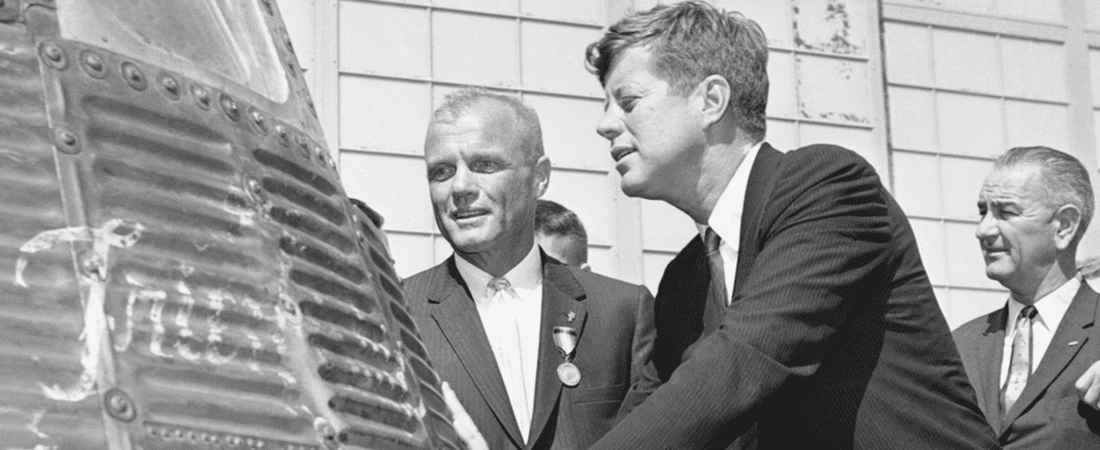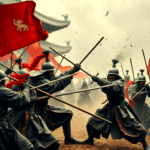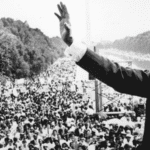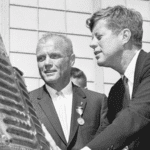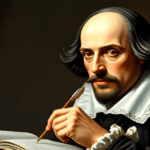John F. Kennedy, the 35th President of the United States, served from January 1961 until his untimely death in November 1963. His presidency is often remembered for its significant impact on American society, as well as for the pivotal historical events that unfolded during this period. Kennedy’s leadership style was characterized by a commitment to public service, an advocacy for civil rights, and a vision for a more equitable world. His ability to inspire hope and ambition resonated strongly with the American populace, a testament to his lasting influence.
During his time in office, JFK navigated through various major events, such as the Cuban Missile Crisis, the establishment of the Peace Corps, and the promotion of the Apollo program, which ultimately aimed to land a man on the moon. These events not only shaped American foreign and domestic policies but also reflected JFK’s determination to position the United States as a leader on the global stage. His famous speeches, which often contained notable quotes, emphasized the importance of civic duty and encouraged citizens to actively participate in shaping the nation’s future.
Kennedy’s legacy is further underpinned by the deep emotional connection he established with the American people. His charisma and intellect inspired many, and his commitment to principles of democracy and freedom remains relevant today. Understanding the context behind JFK’s most memorable quotes is essential to appreciating their continued relevance in modern society. As we delve into his sayings, it is vital to consider not just their surface meanings but also the broader philosophies and ideals they represent. Through this exploration, we gain insight into the character of a leader whose impact endures beyond his presidency.
Exploring Key Quotes
John Fitzgerald Kennedy, the 35th President of the United States, remains a prominent figure known for his charismatic speeches and impactful quotes. Among these, one that stands out is, “Ask not what your country can do for you—ask what you can do for your country.” This profound statement, delivered during his inaugural address in 1961, emphasizes the importance of civic responsibility and encourages citizens to actively contribute to the greater good. The context of the Cold War underscores its significance, as Kennedy sought to unite Americans in the face of external threats, positioning service to the nation as a patriotic duty.
Another notable quote is, “The only thing we have to fear is fear itself.” While this phrase is often attributed to Franklin D. Roosevelt, JFK echoed its sentiment by maintaining resilience during challenging times. His reassurance during the Cuban Missile Crisis in 1962 reflected his belief that an unwavering stance against fear could foster courage and stability. This sentiment was vital for rallying public support and reassuring the populace amidst nuclear tensions between the United States and the Soviet Union.
Furthermore, Kennedy’s declaration, “Change is the law of life. And those who look only to the past or present are certain to miss the future,” speaks to the inevitable nature of progress. In a rapidly changing society, this quote encourages an adaptive mindset, urging individuals to embrace innovation and new ideas. It not only signifies his forward-thinking vision but also addresses the need for adaptability within both governance and personal character. Kennedy’s rhetoric illustrates how his words, grounded in the challenges of his time, resonate with enduring themes of responsibility, courage, and progress, shaping American society and its political landscape.
The Context Behind Kennedy’s Words
John F. Kennedy, the 35th President of the United States, delivered many profound quotes during a period marked by significant social and political upheaval. The early 1960s were characterized by the civil rights movement, which sought to dismantle segregation and promote racial equality. This quest for justice deeply influenced Kennedy’s perspectives, as he navigated the nation’s shifting landscape. In a time when the fight for civil rights was gaining traction, Kennedy’s quotes often reflected a commitment to human dignity and the necessity of progress to ensure freedom for all Americans.
Simultaneously, the Cold War loomed large over the global stage, presenting a unique set of challenges and anxieties. The tension between the United States and the Soviet Union was palpable, with events such as the Cuban Missile Crisis escalating fears of nuclear conflict. Kennedy’s speeches during this tumultuous period often sought to inspire unity and resilience among Americans, stressing the importance of cooperation and peace amidst adversity. His famous phrase, “Ask not what your country can do for you—ask what you can do for your country,” encapsulates this spirit of collective responsibility, urging citizens to contribute positively to both their nation and the world.
Additionally, the advent of the Space Race underscored the competition between the superpowers, pushing Kennedy to emphasize innovation and education in his rhetoric. As the United States aimed to land a man on the Moon, Kennedy’s quotes championed exploration and courage, highlighting the significance of scientific advancement in cementing America’s global leadership. The interplay of these historical events is critical to understanding the depth and intent behind Kennedy’s memorable words. By considering the broader context, we can appreciate how his quotes were not merely rhetorical flourishes but reflections of the pressing issues of his time.
We Choose to Go To The Moon
In the backdrop of the Cold War JFK made one of his most famous speeches, where he committed to put a man on the moon by the end of the decade.
“We choose to go to the Moon… We choose to go to the Moon in this decade and do the other things, not because they are easy, but because they are hard, because that goal will serve to organize and measure the best of our energies and skills, because that challenge is one that we are willing to accept, one we are unwilling to postpone, and one we intend to win, and the others, too.”
The Lasting Impact of JFK’s Quotes
John F. Kennedy’s quotes have transcended their historical context, echoing through time and taking on a life of their own in modern rhetoric. His words resonate strongly in today’s society, regularly referenced in political dialogues, speeches, and various forms of popular culture. This continuing relevance underscores the timeless quality of his insights, reflecting values that remain important to contemporary audiences. For instance, his famous exhortation to “ask not what your country can do for you—ask what you can do for your country” embodies a spirit of civic duty that is still prevalent in discussions about community service and national responsibility.
Moreover, JFK’s quotes address crucial themes such as unity, perseverance, and the courage to face adversity. These themes are especially poignant in today’s political climate, where divisiveness often prevails. By reiterating Kennedy’s ideals in contemporary discussions, politicians, leaders, and citizens alike invoke his legacy to inspire actions towards solidarity and constructive dialogue. Quotes such as “Let us never negotiate out of fear, but let us never fear to negotiate” emphasize the significance of diplomacy and dialogue, encouraging open communication in an increasingly polarized environment.
The impact of JFK’s words also spills into popular culture, with his famous sayings appearing in movies, literature, and art, allowing new generations to connect with his messages. This shows how effective Kennedy’s language has been in articulating complex ideas in a manner that is accessible and relatable. Furthermore, organizations and movements often adopt JFK’s principles, drawing from his enduring vision to galvanize support for various causes, from human rights to environmental activism. His quotes continue to inspire action and instill hope, reinforcing the notion that powerful words can indeed create lasting change in society.
More Historical Quotes To Inspire You
- The Art Of War Quotes – Sun Tzu
 Introduction to The Art of War The Art of War is an ancient Chinese military treatise attributed to Sun Tzu, a military strategist and philosopher who is believed to have lived during the Eastern Zhou period of ancient China, around the 5th century BCE. This seminal work has transcended its original context and remains highly… Read more: The Art Of War Quotes – Sun Tzu
Introduction to The Art of War The Art of War is an ancient Chinese military treatise attributed to Sun Tzu, a military strategist and philosopher who is believed to have lived during the Eastern Zhou period of ancient China, around the 5th century BCE. This seminal work has transcended its original context and remains highly… Read more: The Art Of War Quotes – Sun Tzu - I Have A Dream – Martin Luther King
 Dr Martin Luther King’s I Have A Dream Speech is rightly recognised as a pivotal moment in The Civil Rights Movement. What is not widely known is that the I Have A Dream section was not in the speech he was meant to give.
Dr Martin Luther King’s I Have A Dream Speech is rightly recognised as a pivotal moment in The Civil Rights Movement. What is not widely known is that the I Have A Dream section was not in the speech he was meant to give. - JFK Famous Quotes
 John F. Kennedy, the 35th President of the United States, served from January 1961 until his untimely death in November 1963. His presidency is often remembered for its significant impact on American society, as well as for the pivotal historical events that unfolded during this period. Kennedy’s leadership style was characterized by a commitment to… Read more: JFK Famous Quotes
John F. Kennedy, the 35th President of the United States, served from January 1961 until his untimely death in November 1963. His presidency is often remembered for its significant impact on American society, as well as for the pivotal historical events that unfolded during this period. Kennedy’s leadership style was characterized by a commitment to… Read more: JFK Famous Quotes - William Shakespeare – Linguistic Genius
 William Shakespeare, often celebrated as the most prominent figures in English literature, made an indelible mark on the evolution of the English language. Born in 1564 amidst the Renaissance, a period of profound change and creativity, he contributed significantly to the literary and linguistic landscape of his time. The English language during Shakespeare’s lifetime was… Read more: William Shakespeare – Linguistic Genius
William Shakespeare, often celebrated as the most prominent figures in English literature, made an indelible mark on the evolution of the English language. Born in 1564 amidst the Renaissance, a period of profound change and creativity, he contributed significantly to the literary and linguistic landscape of his time. The English language during Shakespeare’s lifetime was… Read more: William Shakespeare – Linguistic Genius - Winston Churchill Famous Quotes
 Winston Churchill, a pivotal figure in modern history, is best recognized for his unparalleled roles as a British statesman and military leader. Born on November 30, 1874, at Blenheim Palace, into an aristocratic family, Churchill displayed early signs of fortitude and leadership. His political career spanned over five decades, during which he held numerous governmental… Read more: Winston Churchill Famous Quotes
Winston Churchill, a pivotal figure in modern history, is best recognized for his unparalleled roles as a British statesman and military leader. Born on November 30, 1874, at Blenheim Palace, into an aristocratic family, Churchill displayed early signs of fortitude and leadership. His political career spanned over five decades, during which he held numerous governmental… Read more: Winston Churchill Famous Quotes - Crossing the Rubicon: The Moment That Changed History
 The period leading up to Julius Caesar’s crossing of the Rubicon River in 49 BC was marked by significant political and social upheaval in Rome. The Roman Republic was experiencing profound tensions, primarily driven by power struggles between the Senate and prominent military leaders. Julius Caesar, having enjoyed great military success in Gaul, emerged as… Read more: Crossing the Rubicon: The Moment That Changed History
The period leading up to Julius Caesar’s crossing of the Rubicon River in 49 BC was marked by significant political and social upheaval in Rome. The Roman Republic was experiencing profound tensions, primarily driven by power struggles between the Senate and prominent military leaders. Julius Caesar, having enjoyed great military success in Gaul, emerged as… Read more: Crossing the Rubicon: The Moment That Changed History

